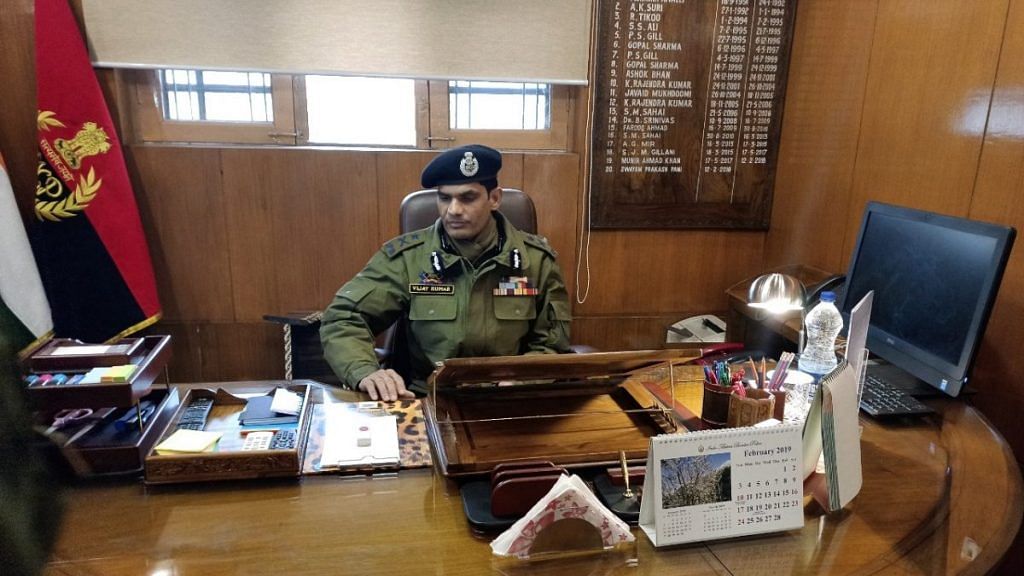Vijay Kumar, the Inspector General of Police Kashmir Range, has further damaged the already strained relations between the cadre officers of the Central Armed Police Forces and the IPS by downplaying the CRPF’s role in maintaining internal security. IGP Kumar recently alleged that the Central Reserve Police Force usurps credit for the work done by the Army and the police in Jammu and Kashmir.
Such uninformed and uncalled for condemnation from an officer who himself was on deputation to the CRPF until recently — and reportedly still enjoys the perks and privileges of this elite internal security force — are nothing short of blasphemous.
“CRPF doesn’t do a good job. (In J&K), the police generates the intelligence and Army and Rashtriya Rifles carry out the operation. CRPF’s name is inserted for nothing. We all know this. I was in the CRPF,” the IGP is reported to have said at an internal meeting held by the Director General of Police J&K in Baramulla on 29 April.
Vijay Kumar forgets that every incident of contact with militants is subject to a court of inquiry to account for the ammunition spent and other losses, if any. The process of inquiry is even more stringent if a life is lost. Even the Intelligence Bureau is called upon to submit a report, especially in cases where gallantry medals are recommended. Does IGP Kumar imply that the outcomes of all these inquiries are false and there is a multi-agency collusion in covering up the incidents?
Let’s not mince our words in condemning such unprofessional comments about the integrity of the CRPF, which is doing a yeoman’s service to India in fighting militancy and insurgency. The CRPF, which is always at the beck and call of policy makers in aid of civil authorities, has proved its mettle over and over again. A large number of CRPF personnel have sacrificed their lives.
Also read: If CAPF cadre wants to be treated as civil servants, it must develop citizen-centric values
Continued desire for control
IGP Vijay Kumar’s comments are symptomatic of the contempt that the Indian Police Service (IPS) officers have for the CAPFs over which they want to retain their stranglehold in contravention of the Supreme Court of India’s orders.
The IPS officers are unable to reconcile with the fact that their hegemony over the senior posts in CAPFs was successfully challenged by the cadre officers. For instance, the Delhi High Court as granted a stay on further deputation of IPS officers in the Central Armed Police Forces. In November 2019, it refused to lift the stay. This has led the IPS officers to criticise and undermine the capabilities of cadre officers on social media and other platforms. Vijay Kumar’s remarks appear to be part of the same strategy.
The IPS Association surreptitiously approached the Delhi High Court recently to get the stay vacated, citing emergent scenario prevailing due to the Covid-19 pandemic. The High Court had no hesitation in throwing out their petition when it was pointed out by the respondents that many IPS officers were repatriated to their states after the outbreak of coronavirus.
The hollowness of their claim of urgency is further busted by the fact that the Narendra Modi government has not found it fit to appoint a regular Director General for the Border Security Force (BSF) for the last two months since the pandemic broke.
The CAPF officers aggrieved by the intransigence of the IPS and the government are already extremely restive and their case regarding the non-implementation of the Supreme Court order granting them the Organised Group A Service status and Non Functional Financial Upgradation pending in the top court.
Also read: IPS officers defending hegemony over CAPFs is like British justifying their rule over India
Unfair dominance to mismanagement
The dominance of higher-level posts by IPS officers is a serious compromise on the national security because IPS officers are unfamiliar with the ethos and operational philosophy of these forces. Even the policy framework adversely affects the avenues of cadre officers, who are the domain experts.
There mismanagement of these forces by IPS officers is apparent from the reported violation of Covid-19 protocol in the CRPF, which appointed an IPS officer, Arun Kumar Sharma of Gujarat cadre, as Additional DG (Medical) in violation of all norms. This IPS officer, going against the advice of medical experts, reduced the quarantine period from 14 days to five days, resulting in a spurt of positive Covid-19 cases and forcing more than a hundred personnel to go into quarantine.
The IPS officers are not only unfamiliar with the Central Armed forces, the transient nature of their lien with the CAPFs precludes them in applying themselves. And so they find themselves out of depth in managing these specialised forces. They have been found wanting even in managing the affairs of state police forces, as was apparent from their total acquiescence to the political masters during the recent riots and other violent situations in Delhi and Uttar Pradesh. Their conduct in ignoring their constitutional obligations in such times doesn’t portend well for our democratic society.
The ill-timed and ill-conceived remark by Vijay Kumar will lead to further deterioration of mutual confidence between IPS and CAPFs and add to the already high level of friction between the officers.
The Modi government needs to take a serious look at the management of CAPFs and hand over the command of these forces to the cadre officers who are fairly experienced, matured and well versed with the psyche of the troops.
The author is a retired additional director general of Border Security Force. Views are personal.
